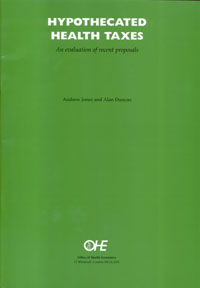The subject of earmarked or hypothecated taxes dropped out of the mainstream of public finance theory a great many years ago. It is doubtful whether many…
The subject of earmarked or hypothecated taxes dropped out of the mainstream of public finance theory a great many years ago. It is doubtful whether many of today’ s economists learnt anything about it in either their undergraduate or graduate days. The reason…
The subject of earmarked or hypothecated taxes dropped out of the mainstream of public finance theory a great many years ago. It is doubtful whether many of today’ s economists learnt anything about it in either their undergraduate or graduate days. The reason was that economists concentrated on such principles of taxation as who benefits or who can afford to pay for a given level of public expenditure. The latter question was determined either within the theory of public goods and externalities or as part of an analysis of improvements in the distribution of income. Some economists were interested in political theories of tax and expenditure determination, although tax and expenditure were not usually related except on occasion in crude commonsense terms. For example, there were those who advocated low taxes as a means of reducing public expenditure, and who opposed tax increases as a means of balancing the budget because they would validate the existing scale of public provision.
Earmarking did not seem to make a lot of sense since there seemed to be nothing intrinsic to a particular tax to warrant relating it explicitly to a specific area of public expenditure, and no other. In addition, it was hard to see the logic of saying that the desirability of this item of public expenditure could be determined by the yield of this tax. There is a logical distinction between saying ‘an x per cent rise in expenditure on nursery schools may require an increase of y percentage points in the basic rate of income tax’, and ‘we have earmarked y percentage points in the basic rate of income tax to determine what can be spent on nursery schools’.
Having said that, there has been a growing interest in hypothecation. One reason for this is at first glance paradoxical. Opinion polls show that people favour increases in the scale of public provision of health and education. At the same time while the same polls appear to show that people recognise the tax consequences of that, when it comes to exercising their role as electors, they show some reluctance to put their money where their mouth is, so to speak. (One should not exaggerate this point. The two opposition parties, taking them broadly as advocates of higher public expenditure, did gain more votes than the conservatives at the last general election, who themselves proceeded to raise taxes and public expenditure!)
A second reason why hypothecation might be attractive is that people may not trust the government, whoever they are. Thus, they would accept tax increases for health, but not for something else. Earmarking the proceeds of a tax or a tax increase may offer some safeguard.
Thirdly, it is worth noting that the national lottery is in the form of an earmarked tax. The treatment of the lottery in the national accounts has been such as not to define the part that goes to the arts and other good causes as taxation as it comes in and public expenditure as it goes out. But it could well be interpreted that way and it looks as if the Treasury has now moved to adopt that classification. More to the point, there is no doubt that we have here a form of hypothecation.
For all these reasons the present booklet is to be welcomed. It offers an easily comprehensible account of the main arguments and places them within a practical framework. It offers a useful survey of recent advocacy of hypothecation (not least the political), but allows the interested reader to come to a balanced conclusion on his own. Thus it will help to foster the kind of serious debate we need on this subject, and also to clarify the broader questions of the future scale and structure of public expenditure and public finance. It will not surprise anyone to be told there are deeper theoretical economic questions to be examined in this field. Some of them are highly technical. The present paper will be followed by another which goes further into these difficult matters. But the present paper is self-contained, and is a serious contribution to the debate.
